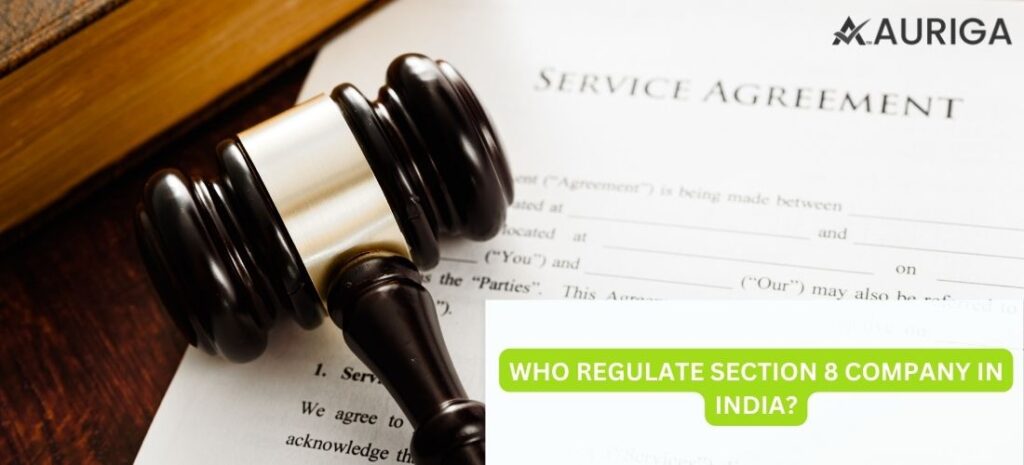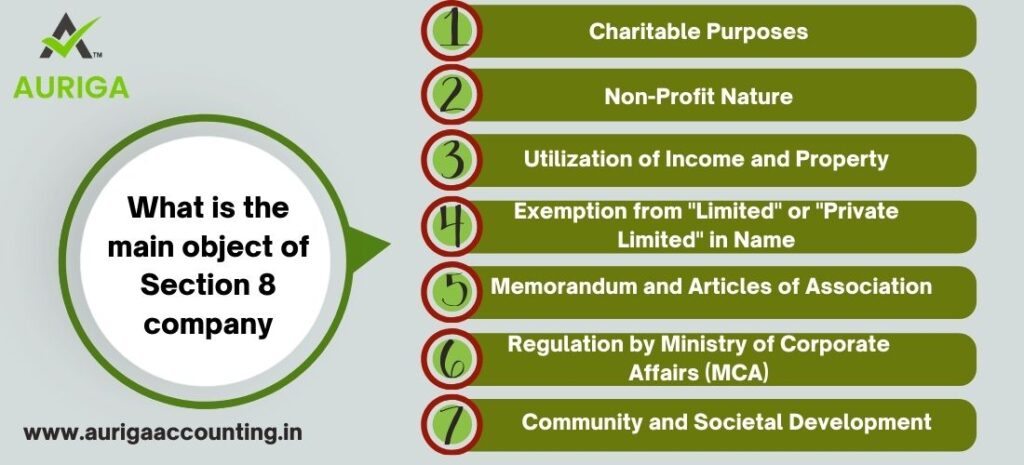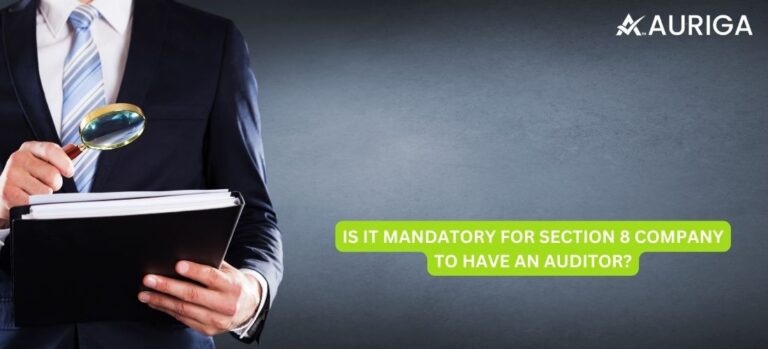
WHO REGULATE SECTION 8 COMPANY IN INDIA?
Introduction
ToggleYOU NEED TO KNOW WHO REGULATE SECTION 8 COMPANY IN INDIA?
Section 8 companies, in India are regulated by the Ministry of Corporate Affairs (MCA) through the office of the Registrar of Companies (RoC). The MCA is the governing body overseeing corporate affairs, and the RoC, functioning under its authority, is responsible for the registration, compliance, and regulation of various types of companies, including Section 8 companies. The regulatory framework for Section 8 companies is established in the Companies Act, 2013. Organizations seeking to form a Section 8 company must submit their memorandum and articles of association to the RoC, and ongoing compliance is monitored to ensure adherence to statutory requirements. The regulatory oversight is crucial for maintaining the non-profit nature of Section 8 companies and promoting transparency in their charitable activities. Visitofficialwebsite.
KEY CHARACTERSTICS OF SECTION 8 COMPANY
Non-Profit Nature: Section 8 companies are strictly non-profit entities. They exist to serve a charitable, educational, or social purpose, and their activities are not driven by profit motives.
Use of Income: Any income or revenue generated by a Section 8 company is reinvested into fulfilling its objectives. This ensures that the organization’s funds are dedicated to its mission.
License Requirement: To function as a Section 8 company, organizations must obtain a license from the ROC. This license ensures that the entity complies with the specific regulations governing such companies.
Tax Benefits: Section 8 companies enjoy tax benefits, including exemptions from income tax on their charitable income. This incentivizes organizations to engage in charitable activities.
Limited Liability: Members of Section 8 companies have limited liability, which means that their personal assets are not at risk in the event of the company’s financial liabilities.
Who is the governing body of Section 8 company
In India, Section 8 companies are governed by the Companies Act, 2013. These companies are formed for promoting commerce, art, science, sports, education, research, social welfare, religion, charity, protection of the environment, or any other charitable purpose. The regulatory body overseeing Section 8 companies is the Ministry of Corporate Affairs (MCA) in India.
The registration and regulation of Section 8 companies fall under the jurisdiction of the Registrar of Companies (RoC), which operates under the MCA. The RoC is responsible for overseeing the incorporation, compliance, and functioning of companies, including Section 8 companies, and ensuring that they adhere to the provisions of the Companies Act.
If you are looking to set up or inquire about a Section 8 company in India, you should refer to the official website of the Ministry of Corporate Affairs (https://www.mca.gov.in/) for the latest information and guidelines. Additionally, you may need to contact the local RoC office for specific details related to the registration and compliance requirements for Section 8 companies.
REGULATION OF SECTION 8 COMPANY
The regulation of Section 8 companies in India is primarily governed by the Companies Act, 2013, and the regulatory authority responsible for overseeing their activities is the ROC. Let’s explore the regulatory framework and key aspects of the regulation of Section 8 companies in India.
Incorporation Process: The process of incorporating a Section 8 company in India is established by the Companies Act, 2013. Entrepreneurs or organizations looking to establish a Section 8 company must apply for incorporation with the ROC. The ROC reviews the documents and details submitted during the incorporation process to ensure they comply with the provisions of the Companies Act. This includes the Memorandum of Association and Articles of Association of the company, the proposed name, and the objectives of the company.
License Requirement: In addition to the standard incorporation process, Section 8 companies must obtain a license from the ROC to be recognized as a Section 8 company. This license is granted if the ROC is satisfied that the company’s objectives are charitable and align with the provisions of Section 8 of the Companies Act.
Name Approval: The ROC also reviews and approves the proposed name of the Section 8 company to ensure that it is unique and complies with the naming guidelines specified in the Companies Act.
Compliance and Oversight: The ROC continues to oversee the activities and compliance of Section 8 companies in India. They may require periodic financial reporting and other regulatory compliance as applicable.
Tax Benefits and Exemptions: While the registration and regulation of Section 8 companies fall under the MCA, the tax benefits and exemptions available to such companies are governed by the Income Tax Act, 1961. Section 8 companies are eligible for various tax benefits, including exemption from income tax on their charitable and educational income.
What is the difference between Pvt Ltd and Section 8 company
Private Limited Company and Section 8 Company are distinct legal structures in India, each serving different purposes. Here are the key differences between a Private Limited Company and a Section 8 Company:
Objective and Purpose:
- Private Limited Company: This type of company is formed primarily for conducting business activities with the objective of making profits. It can engage in various commercial ventures and industries.
- Section 8 Company: The main purpose of a Section 8 Company is to promote charitable activities, social welfare, or other non-profit objectives. It is formed for the advancement of specific causes without the intention of generating profits for its members.
2. Profit Distribution:
- Private Limited Company: Profits earned by a Private Limited Company can be distributed among its shareholders in the form of dividends.
- Section 8 Company: A Section 8 Company is prohibited from distributing any profits or dividends to its members. All income generated must be used for promoting its objectives.
3. Name and Designation:
- Private Limited Company: The name of a Private Limited Company must end with “Private Limited” or “Pvt Ltd,” highlighting its nature as a for-profit entity.
- Section 8 Company: Section 8 Companies are exempted from using terms like “Limited” or “Private Limited” in their names. This exemption emphasizes their non-profit status.
4. Regulatory Compliance:
- Private Limited Company: Private Limited Companies need to comply with standard corporate regulations, including filing annual financial statements and other statutory requirements.
- Section 8 Company: Section 8 Companies also need to comply with corporate regulations, but their focus is on ensuring that their activities align with their charitable or non-profit objectives.
5. Limited Liability:
- Private Limited Company: Members of a Private Limited Company enjoy limited liability, meaning their personal assets are generally protected from the company’s debts and liabilities.
- Section 8 Company: Members of a Section 8 Company also benefit from limited liability.
What are the rules and regulations for Section 8 company in India
- Minimum Requirement: A Section 8 Company must be incorporated with a minimum of two directors and two members.
- No Minimum Share Capital: …
- Charitable Object: …
- Management Team: …
- Regulation under the Companies Act, 2013: …
- Income Tax: …
- GST Registration:
Is Section 8 a government company
Section 8 Companies are a type of Non-Governmental Organizations in India and are registered under the Companies Act 2013. They are not-for-profit organizations that are set up for charitable purposes such as promoting commerce, art, science, religion, charity, and other objects of public interest.
How many directors are there in a Section 8 company
Section 149(1) of the Companies Act 2013 – prescribed a minimum of 3 & 2 directors for public limited & private limited companies respectively and a maximum of 15 directors. But there is no minimum or maximum prescription for Section 8 company.

What is the main object of Section 8 company
A Section 8 company, governed by the Companies Act, 2013 in India, has a primary objective of promoting charitable activities and working for the public welfare. Here are key points outlining the main object of a Section 8 company:
Charitable Purposes: The fundamental purpose of a Section 8 company is to engage in activities that are charitable, philanthropic, or for the general public benefit. This includes promoting commerce, art, science, sports, education, research, social welfare, religion, charity, and the protection of the environment.
Non-Profit Nature: Unlike other types of companies, a Section 8 company operates on a non-profit basis. It cannot distribute dividends or profits among its members and is required to reinvest any surplus funds back into its charitable activities.
Utilization of Income and Property: The income and property of a Section 8 company are dedicated solely to the promotion of its charitable objectives. This ensures that the financial resources of the organization are directed towards benefiting society rather than private individuals.
Exemption from “Limited” or “Private Limited” in Name: A Section 8 company is exempted from using the terms “Limited” or “Private Limited” in its name, highlighting its non-profit status and focusing on its commitment to charitable causes.
Memorandum and Articles of Association: To establish a Section 8 company, organizations must submit a memorandum and articles of association to the Registrar of Companies (RoC). These documents clearly outline the objectives of the company and the manner in which it intends to achieve its charitable goals.
Regulation by Ministry of Corporate Affairs (MCA): The registration and regulation of Section 8 companies fall under the purview of the Ministry of Corporate Affairs. The Registrar of Companies (RoC), operating under the MCA, oversees the incorporation, compliance, and functioning of these companies.
Community and Societal Development: The overarching goal of a Section 8 company is to contribute to the social, cultural, educational, and economic development of the community and the nation as a whole. It aims to address societal needs and improve the well-being of individuals.
In summary, the main object of a Section 8 company is to operate exclusively for charitable and public welfare purposes, with a focus on benefiting society without the pursuit of profits for its members.
Is audit mandatory for Section 8 companies
Yes, audit is mandatory for Section 8 companies in India. As per the Companies Act, 2013, Section 8 companies are required to comply with auditing requirements like any other company registered under the Act. The primary purpose of an audit is to ensure transparency, accuracy, and accountability in the financial reporting of the company.
Section 8 companies must appoint an auditor or auditors who are qualified to conduct an audit of the company’s financial statements. The auditor examines the financial records, transactions, and statements of the company to provide an independent opinion on the accuracy and fairness of the financial information presented.
The audit is crucial for stakeholders, including members, donors, and the public, as it enhances confidence in the financial integrity of the Section 8 company. The audited financial statements provide a true and fair view of the company’s financial position and performance, helping stakeholders make informed decisions.
Non-compliance with auditing requirements can lead to penalties and legal consequences for the Section 8 company and its officers. Therefore, it is essential for Section 8 companies to fulfill their auditing obligations in accordance with the provisions of the Companies Act, contributing to transparency and accountability in their operations.
Which type of company is Section 8 company
A Section 8 company is a type of company defined under the Companies Act, 2013 in India. It is a legal structure that is specifically designed for organizations intending to promote charitable activities, social welfare, and other non-profit objectives. The name “Section 8” refers to Section 8 of the Companies Act, which outlines the legal provisions governing such companies.
Key characteristics of a Section 8 company include:
Non-profit Nature: Section 8 companies are established for promoting charitable purposes and are prohibited from distributing profits among their members. Any income generated by the company is reinvested into its objectives.
Utilization of Income and Property: The income and property of a Section 8 company are solely dedicated to the promotion of its charitable objectives. This ensures that the financial resources of the organization are directed towards its social or public welfare goals.
Limited Liability: Like other types of companies, Section 8 companies have the benefit of limited liability for their members. The personal assets of the members are generally protected from the company’s liabilities.
Exemption from Certain Requirements: Section 8 companies are exempted from using the terms “Limited” or “Private Limited” in their names, emphasizing their non-profit status.
KEY REGULATORY REQUIREMENT OF SECTION 8 COMPANY
To maintain their status as non-profit entities and enjoy the associated benefits, Section 8 companies must adhere to several regulatory requirements. These requirements are designed to ensure transparency, accountability, and adherence to the organization’s charitable objectives. Here are some key regulatory requirements:
Charitable Objects: Section 8 companies must ensure that their activities are aligned with their charitable objects, as stated in their Memorandum of Association. These objects must be in line with the provisions of Section 8 of the Companies Act.
Compliance with Companies Act: These entities are subject to the provisions of the Companies Act, 2013, and must adhere to corporate governance standards, financial reporting requirements, and other legal obligations applicable to companies.
License from ROC: Section 8 companies must obtain a license from the ROC. The license certifies that the ROC has reviewed and approved the organization’s objectives and activities as being charitable and in compliance with the law.
No Dividends: Unlike for-profit companies, Section 8 companies are prohibited from distributing profits or dividends among their members. Any surplus generated must be utilized for furthering the organization’s objectives.
Annual Financial Statements: Section 8 companies are required to prepare and file annual financial statements with the ROC. These statements should provide a clear view of the company’s financial position and activities.
Board of Directors: These companies must have a Board of Directors responsible for governing and managing the organization. The Board should
What documents are required for closure of Section 8 company
- Certificate of Incorporation.
- Memorandum of Association (MOA)
- Articles of Association (AOA)
- Last audited Balance sheet and profit & loss account.
- Audit report.
- Copy of newspaper advertisement.
- Digital Signature Certificate (DSC) of existing directors.
Conclusion
In conclusion, the Ministry of Corporate Affairs, through the Registrar of Companies, is the regulatory authority overseeing the establishment, functioning, and compliance of Section 8 companies in India. The regulatory framework is designed to ensure transparency, accountability, and the fulfillment of the non-profit objectives for which these companies are established.
HOW AURIGA ACCOUNTING HELP YOU TO DEFINE REGULATION OF SECTION 8 COMPANY
Legal Expertise: Auriga Accounting has a team of legal experts well-versed in the regulations and compliance requirements for Section 8 companies. They can provide comprehensive guidance on the legal framework, including the Companies Act, 2013, and other relevant laws.
Incorporation Assistance: Auriga Accounting can assist in the process of incorporating a Section 8 company. This includes preparing the necessary documentation, such as the Memorandum of Association and Articles of Association, and ensuring that the proposed name and objectives align with regulatory requirements.
License Application: Section 8 companies require a license from the Registrar of Companies (ROC). Auriga Accounting can facilitate the application for this license, ensuring that all necessary criteria are met to obtain approval.
Compliance Support: Maintaining compliance with the regulatory framework is crucial for Section 8 companies. Auriga Accounting can help ensure that the organization adheres to the Companies Act and other relevant laws by offering guidance on corporate governance, financial reporting, and other compliance requirements.
Financial Reporting: Section 8 companies are required to prepare and file annual financial statements with the ROC. Auriga Accounting can assist in the preparation of these financial statements to ensure accuracy and compliance with regulatory standards.
Tax Benefits: Understanding and optimizing the tax benefits available to Section 8 companies is essential. Auriga Accounting can provide guidance on tax planning and exemptions under the Income Tax Act, 1961, helping these organizations make the most of their tax benefits.
Board Governance: The structure and functioning of the Board of Directors are crucial for Section 8 companies. Auriga Accounting can offer advice on board governance, including the appointment and roles of directors, to ensure effective management and decision-making.
Regulatory Updates: The legal and regulatory landscape can change over time. Auriga Accounting keeps abreast of regulatory updates and can help Section 8 companies stay informed about any changes in laws or compliance requirements.
Training and Workshops: Auriga Accounting may provide training sessions or workshops to educate the management and staff of Section 8 companies on compliance and governance best practices.
Risk Management: Ensuring that the organization operates within the bounds of the law and mitigates legal and regulatory risks is crucial. Auriga Accounting can help in identifying and managing potential risks associated with non-compliance.












